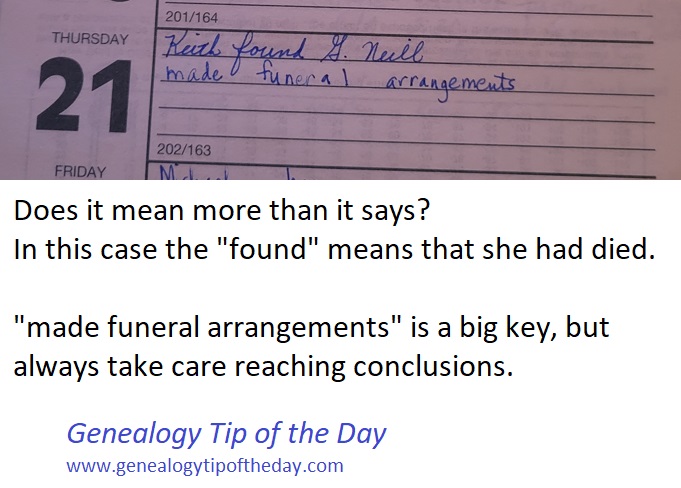
The entry in my Mom’s calendar for 21 July 1994 says:
Keith found G. Neill
made funeral arrangements
I can easily interpret the two lines because I know what happened on that date. I know that “G. Neill” is a reference to Grandma Neill and not some relative named Gerald or someone else whose name begins with the letter G. It’s when we don’t already know the information to which something is referring that interpretation can be difficult.
“Found” in this case does not mean that she had been lost. It means that she was deceased when my father found her. The comment about making funeral arrangements is suggestive of what “found” meant in this case. That’s a good reminder to always look at things in context.
When analyzing a statement or reference that is cryptic or confusing, it’s important to locate as much about the item as possible–when it was written, who wrote it, what its purpose was, etc. It’s also helpful to begin on identifying and analyzing the things that are clear to interpret and not likely to be misunderstood–who Keith is and what funeral arrangements are is pretty clear to me. Also read the item in the context of other items in the material in which they were located. In this case, there are other references to my Grandmother’s funeral in the days after this entry.
I also remember that my Mother always called her mother-in-law Grandma Neill. I never heard her refer to her by her first name and the only time I’ve seen Mom refer to Grandma as “Mrs. Neill” is on a few items created early in my parents’ marriage. While Grandma was a Grandma before my parents married, it appears that my Mom never referred to her mother-in-law as Grandma until after my Mom had children.
But sometimes “found” means more than simply “found.” One should always be thinking about what one finds.
Join Michael at either the Allen County Public Library in Ft. Wayne, Indiana, or the Family History Library in Salt Lake City this summer!







3 Responses
It’s always interesting to hear how people refer to relatives, such as grandmas and grandpas or even aunts or uncles. In my family, we always referred to my maternal grandfather as Grandpa Brown and my paternal grandmother as Grandma Zakrzewki (although we loving refer to her now, after her death, as Grandma Z). My kids call my dad Papa (that started when my son couldn’t pronounce Grandpa, so he said papa and it stuck ever since) but when my dad remarried after mom died, the kids in the family (mine and my sister’s) just called her grandma or grandma Suzi as they had called mom Grandma Carey (her last name). We refer to our aunts as Auntie (pronounced anty).
The other interesting thing I’ve noticed is that whenever I’ve talked about my mom’s family, I’ve always referred as Mom’s mom, instead of Grandma. She died when my mother was only 9, so I never knew her. Although, I’ve always referred to my mom’s grandmother as Grandma Elniski and I never met her either!
My daughter was the first grandchild on both sides, she called her dad’s parents, Grandma Polly and Grandpa Polly, my parents as Grandma Bill and Grandpa Bill. My in-laws were Gwen & Bill, Polly was the dog. Polly lived there. My parents were Kay And Crawford, my teen brother, Bill, lived there. That’s how my toddler knew which grandparents we were going to see. LOL!
My Grandmother always referred to Uncle Charles as whose uncle he was: your Uncle Charles, your mother’s Uncle Charles, my Uncle Charles. It wasn’t until years later, I realized they all had different last names. She could have said Uncle Charles Cooper, Uncle Charles Risinger, or Uncle Charles Deiss. She also never referred to her brother as anything but “your mother’s Uncle Charles” except for once when talking about what they did as children.